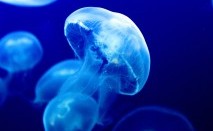
Category: Invertebrates

“Water bears” or “moss piglets” are tiny (~0.5 mm), aquatic, segmented animals that are able to withstand extreme environmental conditions – including temperatures that are exceedingly low (almost absolute zero) and high (well over water’s boiling point), extreme pressure, high doses of ionizing radiation, and the vacuum of outer space! They can also survive without food or water for over ten years and then resume foraging and reproducing upon rehydration. Around 1,150 species have been described, and tardigrades can be found almost everywhere in the world, though they are most abundant in moist environments.

The world’s first Animals
Invertebrates were the first animals to evolve. While their soft bodies left precious few records behind, there are fossils of sponge-like animals that are 665 million years old, as well as traces of tracks and burros from worm-like animals going back 1 billion years. By comparison, the earliest birds appeared only 150 million years ago! And not only were invertebrates first, they are the most plentiful of animals - it is estimated that 97% of all animals living on the Earth today are invertebrates, with several groups containing more species than all vertebrates combined!
Learn more >>
 Discover Animals is a web-based educational resource offered by the NAIA
Discover Animals is a web-based educational resource offered by the NAIA